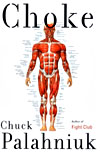
Comment
on this story
|
 |

Dystopian writer Palahniuk Heimlichs his audience
by Paul Lewis
Chuck Palahniuk is known to most as the guy who wrote the book that was adapted into the film Fight Club. And rightly so—it's not an unpleasant calling card for a young writer with four novels to his credit to have crafted the basis for one of the most debated and most fulfilling studio film exercises of the past several seasons. His new work, Choke (Doubleday, $24.95), wanders the same back alleys as his previous work (also including Survivor and Invisible Monsters) but manages to find a different off-ramp to its conclusions.

Palahniuk's gastrointestinally disturbed protagonist is med school dropout Victor Mancini. He works as an "indentured servant" in a theme park that re-creates Colonial America circa 1734. He attends Sex Addicts Anonymous meetings to pick up pointers and loose women (and he remains stuck on the fourth step in the program—making an inventory of wrongs). And, most importantly to the plot and the title, he pretends to choke in restaurants so that people who "save" him and, therefore, feel responsibility for his well-being will cough up cash to keep his ailing, Alzheimer's-suffering, anarchist mother on life-support (the similarity of a Heimlich maneuver to a hug is an obvious yet clever touch). He's a confused tabula rasa who thinks he has most of the answers he needs yet discovers that he doesn't know his inner self. Add a confused and obsessive-compulsive best friend who collects large rocks and a nursing home doctor who wants to bear his child, and you have the bouillabaisse of personal and professional dysfunction that's becoming de rigeur Palahniuk.
Much like Douglas "Generation X" Coupland, Palahniuk is not so much a novelist as a chronicler of post-Boomer passions and dispassions and a purveyor of societal truisms. He's also insanely incisive regarding the darker aspects of human behavior and pretty damn darkly funny to boot. Ever wondered what unpleasant things happened to a prisoner held overnight in stocks? Wonder no more. Ever been concerned about the strange, random names called out over paging systems in public places? Covered. Ever considered the nuts and bolts of how to abduct a child? It's been considered for you. The whys and wherefores of sex on an airplane? Yep. You'll laugh or be disturbed by these illustrations, or more likely both. It's a mark of talent to elicit conflicting emotions within an audience, within the same sentence, and Palahniuk does this deftly and with regularity.
The bizarre aspects of this novel, and there are a lot of them, act not only as a commentary on the absurdities in our culture and in our lives, but as a pointed challenge. Palahniuk is pitching his readers high and inside, daring the audience to swing or get out of the way.
Despite this harshness, the most refreshing aspect of Choke is its discovery of hope and potential for redemption within the nihilism of its world. Victor's struggle is one of identity—he thinks he has no control over his destiny, begins to believe differently when his lineage is called into question (don't ask), and is forced to find an answer when his life and world manages to unravel. Victor serves as an agent of absolution, alternatingly as a matter of pragmatism, out of a sense of genetic obligation, and because it seems the right thing to do—a struggle against his harsher nature that he often loses by default. His life as he knows it comes to an end, his paradigm is forcibly shifted, and without being syrupy, this lesson of humanistic self-determination and sympathy allows him to rebuild himself; it's a recurring tenet of Palahniuk's work that you have to be destroyed to know who you really are and start over. It's likely as close to a happy ending we'll get from this writer unless he tosses it all and joins the writing staff of Touched By An Angel, a prospect I'd pay good money to see.
As sparkling in its spare use as Choke's prose is, and as intriguingly effed-up and colorful his characters, it would be interesting to see Palahniuk expand his horizons past the obvious basket cases and grotesque physical freaks who people his satire and commentary. It's hard to declare that a writer you enjoy who tackles important topics with wit and style might be ripping himself off, but in its weaker moments Choke could almost pass as edited-out subplots from Fight Club. Thank heaven the balance of the book is so thought-provoking, readable, and splendidly audacious that you don't really care that those bits seem to be from an older title.

November 1, 2001 * Vol. 11, No. 44
© 2001 Metro Pulse
|